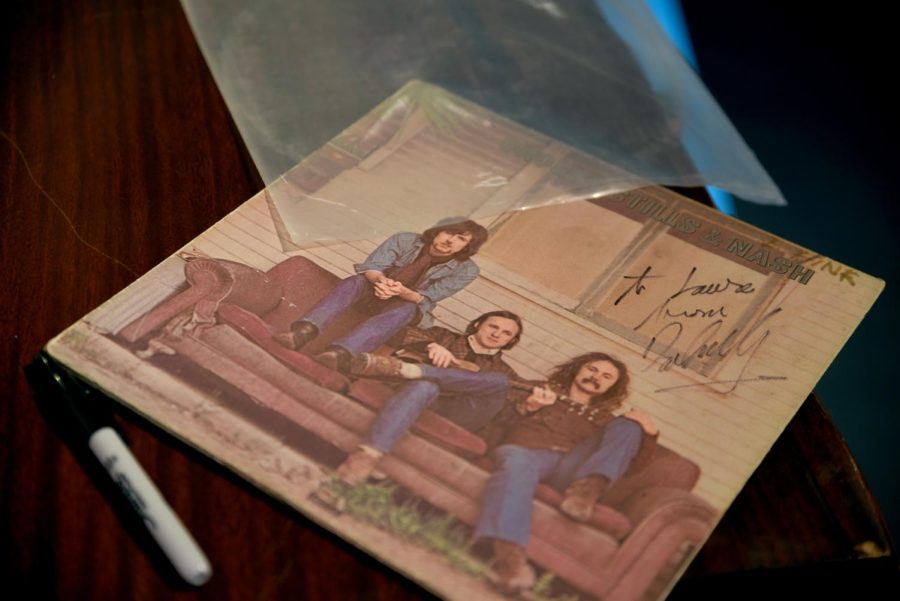David Crosby visits May 4 Visitors Center
November 5, 2017
The rain falls on a dreary Sunday afternoon in Kent. Closer to the back side of campus, situated on top of a hill, stands Taylor Hall.
Inside, the May 4 Visitors Center shows life for a special guest who quietly stands against the middle pillar of the room to watch the movie by the center. The gunshots, screams and narrating voice ring from the movie, but only silence comes from the guest who watches.
Once the movie finishes, the guest makes his way out into the hallway and pauses in silence. After a moment, he resumes talking with the film crew that follows behind.
David Crosby, an American singer-songwriter and musician, makes his way back through the museum again.
Crosby stops and points to a picture of people smiling displayed in the museum. “I like that picture of those happy people,” Crosby said. “That’s what music does.”
Crosby came to the May 4 Visitors Center Sunday as a minor detour from his 2017 David Crosby and Friends Sky Trails Tour, as well as part of a documentary being filmed about him.
When filming was done in the museum for the documentary, Crosby sat down with student media and Eric Mansfield, the executive director of University Media Relations, to talk.
Crosby’s relationship with May 4 stems from 1970 when him and his then-band, Crosby, Stills, Nash & Young wrote a protest song about the shootings called ‘Ohio.’
“We were in a house in California. I heard about (the shootings) on the radio and I couldn’t believe it,” Crosby recalls. “I watched it hit Neil (Young). It hit him hard. And I watched him write ‘Ohio’ right there. I remember calling Nash like, ‘Get a studio right now,’ and we recorded it. We got it out right away.”
‘Ohio’ went to 14 on the U.S. Billboard Hot 100 charts, and was even banned on some radio stations because the challenge it had on Nixon’s presidency at the time, a fact that surprised Crosby.
However, Crosby said even after all the time, he still feels the same playing it.
“As soon as you hit the first opening notes, I’m gone,” he said. “I’m in it. It comes right back. I’m screaming ‘Four why?’”
After speaking with student media, Crosby was taken upstairs in Taylor Hall to continue filming for the documentary. While being in a serious setting, Crosby met everybody with genuine humor.
Getting ready, he would joke, “I’m ready for my closeup!” only to regain his stature for the interview, putting on a serious face and honest tone.
Crosby shared stories of Woodstock, the cost of freedom, his experience with protesting and his appreciation for bravery of those who do it and how today’s political climate reminds him so much of the 1970s.
He also mentioned the woman who led him through the museum, Laura Davis, the co-founder of the May 4 Visitors Center and a witness to the shootings that took place on May 4, 1970.
“I thanked him for recording ‘Ohio’ because it was very difficult,” Davis said. “I was a freshman student here and it was difficult to be surrounded by so many negative voices. When that song came out, it was a beacon of truth.”
Davis said out of all the misinformation that came out at the time, the song was something she could trust.
“It took the side of the protestors,” Davis said. “There was so much horribleness directed toward students but that song. That’s what I told him today.”
Before the last interview was done, Mansfield paused for a moment as Crosby talked and mentioned asking him questions earlier.
“He’s so honest,” Mansfield said. “He’s not like other famous people who try and hide things. He’s really honest, you know? He’s like, ‘I’m pissed!’ That means so much.”
Outside, the rain had stopped long enough for Crosby, Davis and the film crew to explore the dedicated bench and four pillars that represent the students that were killed.
From there, they went to the parking lot and visited the sites of the memorial for each student that was killed on the ground.
With camera crews rolling, Crosby placed a single stone on Jeffrey Glenn Miller’s memorial, the student killed closest to the National Guardsmen that day.
Crosby left quietly in time for soundcheck for his sold-out concert that night at the Kent Stage, but said he couldn’t think of a word that summed up all of his thoughts today.
“I can’t do one word,” Crosby said. “The single most important factor here was courage. So, if you want one word, it’s courage. These people were brave. They were very brave, and they got shot to death for it. They’re still inspiring us, though. To this day, when I walk into a demonstration and face cops, I think of these people.”
Zoe Swartz is the room and board reporter. Contact her at [email protected].












